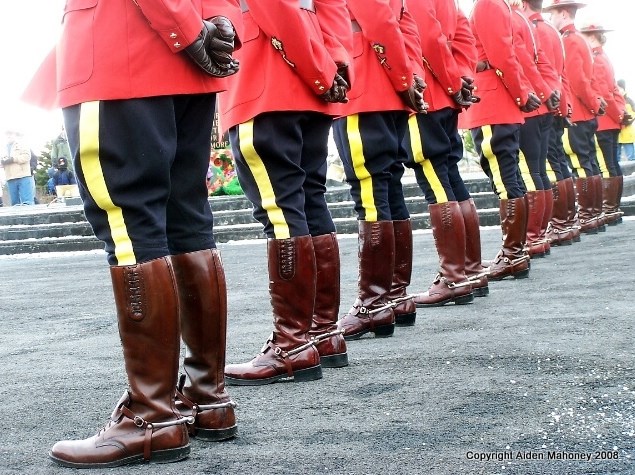By Melanie Jacob
Journal Editor
Depending on whom you ask, people either revere the RCMP as the good guys, or fear them as society's wardens; yet much of their real work is done behind a desk or following up on casework.
"If there are calls waiting for us when we come, then we respond to those," said Senior Cst. Marc Thibodeau. "If not, you can work on some files, you can go write tickets, or you can go see people for statements. It's really hard to say what a typical day is because there is no typical day."
One of the most surprising aspects to an RCMP's job is their autonomy over their own work. As long as cases are followed up on, paperwork is done, and calls are answered, they can choose to do any task, be it educating kids at schools or writing tickets within their jurisdiction.
"I think the best part of the job is being your own boss; you're in charge of the files that come in while on shift," said Thibodeau. "Ultimately, there is someone that supervises you and oversees the work that you do, but when I come to work, it's up to me what I do today, unless I have a call come in. I enjoy that freedom of doing what I want to do and going where I want to go."
Thibodeau said the main thing is that the officers should be involved in the communities, going out and doing stuff. Since many of the RCMP might not be from the area, it's even more important that they develop a healthy relationship with the community. Regardless, it's up to them how and when they do what needs to be done.
"When you come in, unless the supervisor tells you to do something, you're pretty much your own boss," said Thibodeau. "If you come in and you want to go write tickets, you can go write tickets. If you want to go see someone or go on patrol, it's completely up to you. Supervisors don't dictate what you have to accomplish unless something comes up that they want you to do."
Despite this, the detachment does have nationally regulated impaired driving blitzes that come every month. During these days and other days like it, officers will set up check stops and focus on those specific driving infractions. Since speeding is usually the main cause of accidents, it's the one they look for the most.
"Sometimes it might be speeding, sometimes it might be set up around street stop signs," he said. "We're not necessarily stricter, but instead of going out on patrol, we'll just set up specifically looking for that infraction."
In terms of the kinds of calls they get, it can vary. According to Thibodeau, they've recently seen a small increase in thefts and crimes of opportunity. With Humboldt being such a trusting community, it's fairly easy for people to break into cars or houses and steal property.
Thibodeau also said they sometimes receive 9-1-1 calls that aren't emergencies. While he doesn't want to discourage anyone from contacting them if they're in need, he recommends calling the detachment if it's not an emergency.
"I would say for sure easily 20 per cent of the calls are ones that people could and should handle on their own," he said. "If they're dialing 9-1-1, it should be an emergency. An emergency is something that is urgent, i.e. someone is breaking into your house, there's an impaired driver you're worried might kill somebody, or it's something ongoing at that moment, like a physical altercation."
In other words, something that happened a week ago or isn't life threatening probably isn't urgent. Somebody or something should be in jeopardy.
While said he Thibodeau understands that callers are usually trying to get a hold of someone quickly, calling them via the 9-1-1 channel unnecessarily ties up emergency operators. Calling the RCMP at the detachment will still patch them through, but at least it won't detract available operators.
At the end of the day, the RCMP are there to serve the community, whether they're appreciated or not. The only thing Thibodeau doesn't appreciate is the idea that they all like coffee and donuts. He doesn't even drink coffee.




